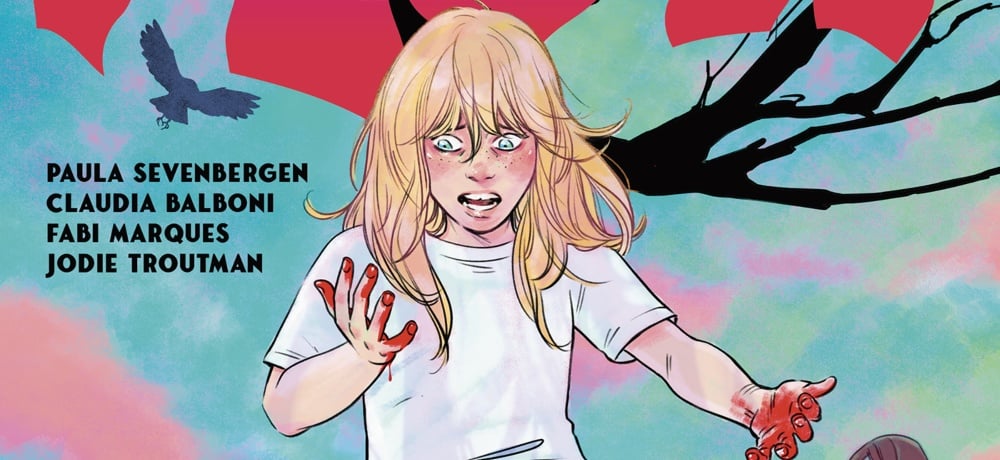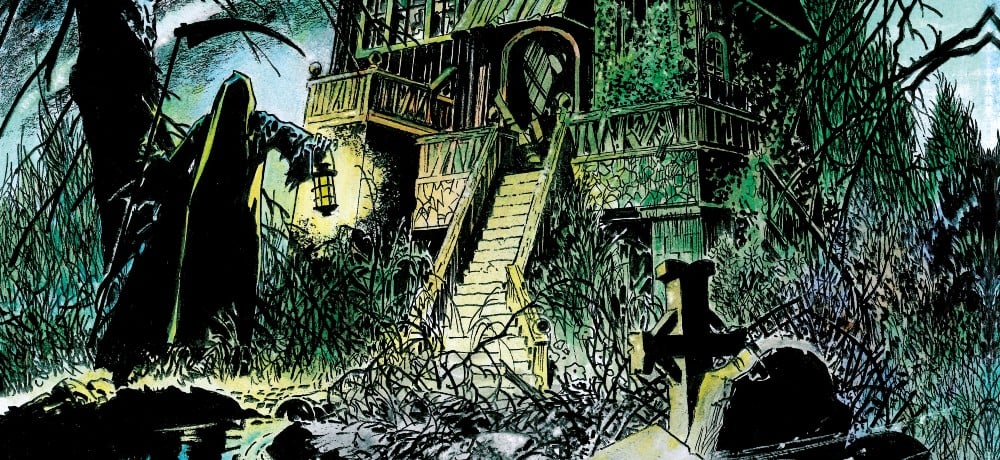





One of the more intriguing thrillers I’ve seen in some time is Road Games, which was written and directed by Abner Pastoll and recently debuted on VOD courtesy of IFC Midnight. Starring Andrew Simpson, Joséphine de La Baume, Barbara Crampton, and Frédéric Pierrot, the film begins as a whodunit road movie and is later infused with some unexpectedly fun slasher undertones.
Daily Dead recently sat down with both Pastoll and genre legend Crampton to hear more about their collaboration, Pastoll’s approach to crafting the film’s mystery, their experiences shooting Road Games, and much more.
Congrats on making a movie that keeps you guessing and takes a few unexpected turns. Abner, what were your inspirations behind this story and your approach to really toying with viewers?
Abner Pastoll: In terms of playing with people's suspicions, those inspirations are totally from Hitchcock's films because he would always do that. It's a tricky thing, because when you're playing with expectations to an extent, people are expecting a certain thing to happen and then it turns around and it doesn't happen that way. When you do that, a lot of people will be disappointed in a sense because they somehow don’t get the resolution they were expecting. When you watch this, you get your resolution and it might not be what you wanted it to be. Some people are taken aback and other people are the complete opposite. It’s been interesting to watch people react.
For me, it is what it is and everybody's going to take something different from it. For actually constructing that, I always wanted to do something that did play with expectations because everything's been done before in a sense. Every story's been told.
Barbara Crampton: Plus, there are only eight stories ever created.
Abner Pastoll: Apparently, or maybe even one. I just wanted to do my own unique perspective on that kind of suspense and play around with it a little bit.
Barbara, it's really cool to see where your career is going these days because everything's been a bit different from everything else. Has that been in the back of your mind, to keep mixing it up in this stage of your career? Mary is very unlike anything we've seen from you.
Barbara Crampton: Yeah, at this point in my career, I want to entertain myself as well. I don't want characters to be the same. I don't want to play the same thing. Whatever's on the page, sometimes you can infuse your own personality upon. I do actively think about that. I don't want to repeat myself, I don't want to play the same thing, and I'm not accepting everything that's been offered to me the past few years. I'm being pretty selective and just taking some interesting roles and things that I feel I could amuse myself with and bring something to and have fun with.
One of the things that drew me to Road Games was how good the script was. I read the script and thought it was one of the most well-crafted pieces of cinema I had ever read. It was really well done. All the characters had a voice and it was about one thing, but it was about everybody's different feelings about that one thing. Who is the serial killer and why are they doing this? How does each character have their say about it? By the end of the movie you understand what it's about. I really thought it was a terrific script and just different and interesting.
I read that you shot this in England for the setting of France—is that correct?
Abner Pastoll: We did shoot this in England. I was very conscious during shooting to not reveal anything that would give away that it's England. We had a five-week shooting schedule—it was 25 days actually—and 20 days were shot in England and then we did five days in France. It was also tricky because in England they drive on the left side of the road, but in France they drive on the right side of the road and we have all of these scenes where they're driving the car, so we had to block off the entire road and switch everything around. A lot of the shoot in England was very tricky.
Barbara, your character feels a bit like a fish out of water in this story, so did going over there to film help you get immersed in Mary's world?
Barbara Crampton: Yeah, my character is a little bit lost. She's dealing with something that is very difficult to deal with, and she can't quite break out of it. It was a feeling of being isolated and displaced and not being completely comfortable. Whenever you’re shooting a movie in a different country, you feel like that. I felt like a foreigner in my own home because of what goes on in the movie and from shooting over there as well.
That being said, we had a great cast and crew experience. We all got along really well. We really felt like a family.
Abner Pastoll: It also helped that I was away from home, too. We were in the countryside and we were all staying in the same hotel together. After shooting, it was like going home and being with your family. We had this really good rapport—we did a lot of the work out of hours in our downtime, then we'd go back to the set and we'd just do it because we had prepared already. I enjoyed that experience of being away from home because even for me, as the director of the film, I wasn't so familiar with the place. I also felt like I was out of place and that added to the film as a whole.
Barbara, I love the relationship between your character and Frédéric’s character. That relationship and those performances are just incredible. Once you realize what the movie is doing, it makes the context of those moments you two share that much stronger.
Barbara Crampton: Yeah, it was incredible working with Frédéric, he's one of the best actors I've ever worked opposite of. We had quite a good rapport. I've since been back to Paris and had dinner at his home and become friends with him.
Abner Pastoll: He loves cooking for people [laughs].
Barbara Crampton: Yeah, my family was over there last summer and he had us at his home and cooked for us. He's just incredible and specific about what he imbues his character with. We talked a lot about our characters and being together. Our characters love each other desperately, but we're caught in this problem that we can't get out of. We had many chats about how the thing that keeps us together is the fact that we genuinely love one another and are very drawn to one another, but he is very stern. I'm much more, in a way, a weaker character than he is.
I'm at the mercy of the situation that's going on. There's a serial killer in our midst and who is it? It's one of the five characters and you don't know who it is until the end. It's a situation that I can't really get out of, but it's also a situation where what keeps me there is my love for my husband and also the fact that he's so strong. He's so much stronger than me, and I don't think I would be able to survive without him. Working with him was just a delight.
Where the genre is at today, Road Games is a movie that definitely stands out. Were both of you aware that this would be a very different movie than what's happening in the independent genre world these days?
Abner Pastoll: Yes, because I go to a lot of film festivals and watch all the genre films—actually, all the films—that I can watch. That was always part of my process of learning how to make sure that my film stood out. That was always the intention, to make it feel like it was its own thing. How can I approach this and make it not be lost? There are so many movies that get made and only so many of them get noticed. There are subtle details that I hope viewers pick up on, like setting the whole movie during daylight or how the finale goes.
I was very conscious of just making this movie my own thing and not trying to imitate anything else too closely. This had to stand out on its own for the right reasons.
Barbara Crampton: You want to make a movie that's popular and is going to make money, obviously, but you also have to please yourself.
Abner Pastoll: Yeah, that's pretty much how I see it, too. It's amazing when anybody likes something that you think of. I had this crazy idea and then eventually, a lifetime later, we actually made the movie and for the most part, people like it. Even just having one person like it, having you like it, that's almost enough for me to keep going as a filmmaker.